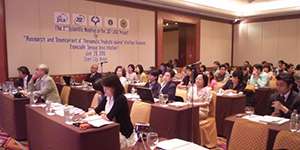Science and Technology Research Partnership for Sustainable Development (SATREPS) program
https://www.jst.go.jp/global/english/
Medical & Biological Laboratories Co., Ltd. (MBL) has announced the successful development of fully human neutralizing antibodies for dengue virus infections. MBL was one of the collaborators in the SATREPS project, “Research and Development of Therapeutic Products against Infectious Diseases, especially Dengue Virus Infection”, led by Prof. Kazuyoshi Ikuta of the Research Institute for Microbial Diseases, Osaka University. The developed antibodies demonstrate effectiveness in inhibiting dengue virus replication, making them candidates for treatment of dengue virus infections.
This success is an outcome of two projects: the SATREPS project (2009-2013) and the New Energy and Industrial Technology Development Organization (NEDO) FY2012 Innovation Commercialization Venture Support project that MBL was later selected for “Effectiveness Assessment in Animal Studies of Anti-Dengue Hemorrhagic Fever Therapeutic Human Antibody Candidates”, 2013-2014.
Dengue is a mosquito-borne disease. In the tropics, there are 50 million new cases of dengue fever, dengue hemorrhagic fever, and other dengue virus infections each year, including 250,000 serious cases. In Japan, a spate of dengue fever infections began in August 2014, with over 140 cases identified by September 25. Research into therapeutic antibodies for dengue infections has led to a number of reports of results, but there is still no effective therapeutic agent or vaccine. People around the world are hoping for the early development of an effective treatment.
The SATREPS project involved collaboration in Thailand with a research group including researchers from the National Institute of Health and Mahidol University Faculty of Tropical Medicine. As part of this project, peripheral blood mononuclear cells in blood samples taken from acute-phase patients were fused with SPYMEG, a fusion partner cell line newly developed by Medical & Biological Laboratories Co., Ltd. Using this method, the researchers succeeded in producing human monoclonal antibodies with a broad reactivity and neutralization against all serotypes of dengue virus (Den-1 to Den-4). The original plan was to use blood samples from convalescent phase patients, but a switch to acute-phase samples driven by local circumstances unexpectedly produced large numbers of broadly neutralizing antibodies. A provisional patent application for this outcome was filed in the US in 2011, followed by a PCT application in 2012. Analysis of these antibodies has been reported in three academic papers to date, including the paper by Tadahiro Sasaki et al. in Antiviral Research that was an award-winner in the Antiviral Research Awards 2014, demonstrating the level of interest in this research.
Evaluation systems for dengue virus using monkeys (rhesus, marmoset) have been reported, but these require very large budgets for conducting tests, so development of an animal model using small animals such as mouse model has been keenly awaited. The SATREPS project succeeded in constructing a mouse model for evaluating dengue virus infections. This is expected to make a large contribution to future research into measures to counter dengue virus infections. The subsequent NEDO-supported project used the dengue virus infection model mouse developed under the SATREPS project, confirming that the effectiveness and safety of tests was similar to that of evaluation tests using marmosets.
Dengue infection is categorized as a neglected tropical disease (NTD), so drug development had typically focused on tropical areas. However, the recent increase in infections in Japan has raised hopes for early commercialization as an antibody drug through out-licensing to domestic and international pharmaceutical companies.
<Links>
- Medical & Biological Laboratories Co., Ltd. press release (September 5, 2014)
“Development of Therapeutic Agents from Fully Human Antibodies for Dengue Virus Infections”
http://v4.eir-parts.net/v4Contents/View.aspx?cat=tdnet&sid=1179220 (Japanese)
- NEDO announcement of FY2012 Innovation Commercialization Venture Support projects
Selected project No. 86, Medical & Biological Laboratories Co., Ltd.: Effectiveness Assessment in Animal Studies of Anti-Dengue Hemorrhagic Fever Therapeutic Human Antibody Candidates
https://www.nedo.go.jp/content/100553054.pdf (Japanese)
- Nikkei coverage (September 5, 2014):
http://www.nikkei.com/article/DGXLASDZ0506O_V00C14A9TJ1000/ (Japanese)
- Reuters coverage (September 5, 2014):
http://jp.reuters.com/article/topNews/idJPKBN0H00FZ20140905 (Japanese)
- TV Asahi News coverage (September 5, 2014):
http://news.tv-asahi.co.jp/news_society/articles/000034015.html (Japanese)
- Antiviral Research Awards 2014
http://www.journals.elsevier.com/antiviral-research/news/antiviral-research-awards-2014/
- JST Topics (July 18, 2013):
Big step towards developing therapeutics for Dengue fever, one of the neglected tropical diseases - SATREPS researchers brief drug companies in Bangkok
http://www.jst.go.jp/report/2013/130718.html (Japanese)
- Science and Technology Research Partnership for Sustainable Development (SATREPS) program
https://www.jst.go.jp/global/english/
SATREPS (Science and Technology Research Partnership for Sustainable Development) is a Japanese government scientific diplomacy program funded jointly by Japan Science and Technology Agency (JST) and the Japan International Cooperation Agency (JICA). SATREPS works to promote both scientific advances and international cooperation through three- to five-year projects in which researchers in Japan and developing countries team up to tackle global issues.
- SATREPS project: Research and Development of Therapeutic Products against Infectious Diseases, especially Dengue Virus Infection
(Principal investigator: Prof. Kazuyoshi Ikuta, Research Institute for Microbial Diseases, Osaka University / Adopted in FY 2008 (4 years) / Counterpart country: Kingdom of Thailand)
http://www.jst.go.jp/global/english/kadai/h2011_thailand.html

JST, an integrated organization of science and technology in Japan, establishes an infrastructure for the entire process from the creation of knowledge to the return to the society. For more information, visit http://www.jst.go.jp/EN/